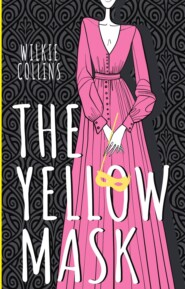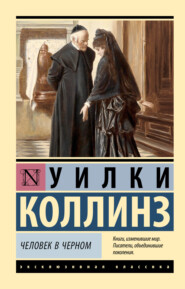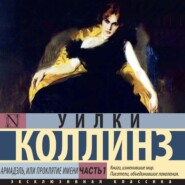По всем вопросам обращайтесь на: info@litportal.ru
(©) 2003-2024.
✖
The Haunted Hotel / Отель с привидениями
Настройки чтения
Размер шрифта
Высота строк
Поля
The writer stated that he had recently arrived in Venice. Ferrari was with Lord and Lady Montbarry, at one of the old Venetian palaces. He was a friend of Ferrari, so he went to pay him a visit. He rang at the door that opened on the canal. No answer. He went round to a side entrance. Here, he found a pale woman with magnificent dark eyes, who was Lady Montbarry herself.
She asked, in Italian, what he wanted. He answered that he wanted to see the courier Ferrari, if it was quite convenient. She at once informed him that Ferrari had left the palace, without any reason. He did not leave an address at which his monthly salary could be paid. Amazed at this reply, the courier inquired if any person had offended Ferrari, or quarrelled with him. The lady answered,
‘To my knowledge, certainly not. I am Lady Montbarry. We are as much astonished as you are at his extraordinary disappearance. If you hear of him, pray let us know.’
The courier at once entered on the necessary investigations – without the slightest result. Nobody saw him. Nobody knew anything. They said that her ladyship’s English maid had left her, before the disappearance of Ferrari, to return to her relatives. His lordship was ill. He lived in the strictest retirement. The courier discovered a stupid old woman who did the housework at the palace. She arrived in the morning and went away at night. She had never seen the lost courier – she had never even seen Lord Montbarry, who was in his room. Her ladyship, ‘a most gracious and adorable mistress,’ was in constant attendance on her noble husband. There was no other servant then in the house but herself.
An Italian doctor once visited his lordship. He also had never seen Ferrari. The doctor described Lord Montbarry’s malady as bronchitis. The police were looking for the lost man – and that was the only hope, to Ferrari’s wife.
‘What do you think of it, Miss?’ the poor woman asked eagerly. ‘What will you advise me to do?’
Agnes did not know what to say. She was not thinking of the lost Ferrari; her mind was in Venice, by the sick man’s bedside.
‘I hardly know what to say,’ she answered.
‘Do you think it would help you, Miss, if you read my husband’s letters to me? There are only three of them.’
Agnes compassionately read the letters. The first letter was from Paris.
‘We leave Paris tomorrow. I don’t much like my lord. He is proud and cold, and, between ourselves, stingy in money matters. We were discussing some centimes in the hotel bill; and twice already. Some sharp remarks passed between the newly-married couple, her ladyship like to purchase pretty tempting things at the shops in Paris. “I can’t afford it!” For my part, I like her. She has the nice, easy manners.’
The second letter was dated from Rome.
‘My lord is incurably restless. I suspect he is uneasy in his mind. He is constantly reading old letters, when her ladyship is not present. We stopped in Genoa, but he hurried us on. The same thing in Florence. My lady’s brother met us in Rome. There was a quarrel already (the lady’s maid tells me) between my lord and the Baron. The latter wanted to borrow money of the former. His lordship refused in language which offended Baron Rivar. My lady pacified them.’
The third, and last letter, was from Venice.
‘More of my lord’s economy! We hired a damp, mouldy, rambling old palace. My lord says the quiet of Venice is good for his nerves. But a foreign architect is going to turn the palace into an hotel. The Baron is still with us, and there are more disagreements about money matters. I don’t like the Baron – and I don’t find my lady agreeable. She was much nicer before the Baron joined us. I receive my salary regularly at the end of each month – not a franc extra, though I do many things which are not part of a courier’s work. And the Baron was trying to borrow money of me! He is an inveterate gambler. And I saw other things besides, which don’t increase my respect for my lady and the Baron. The maid wants to leave. She is a respectable British female. It is a dull life here. When my lord goes out, he goes alone, and generally towards nightfall. Indoors, he shuts himself up in his own room with his books, and sees as little of his wife and the Baron as possible. Does he suspect anything? Who knows. However, the pay is good – and I’m not going to leave, like my lady’s maid.’
Agnes handed back the letters with feelings of shame and distress.
‘The one thing I can suggest,’ she said, ‘to consult a person of greater experience than ours. I will write and ask my lawyer to come and advise us tomorrow.’
Emily eagerly and gratefully accepted the suggestion. An hour was arranged for the meeting on the next day; and the courier’s wife left.
Weary and heartsick, Agnes lay down on the sofa, to rest and compose herself. The careful nurse brought a cup of tea. They were talking quietly, when they heard a loud knock at the house door. Hurried footsteps ascended the stairs. The door of the sitting-room was thrown open violently; the courier’s wife rushed in like a mad woman.
‘He’s dead! They’ve murdered him!’
Those wild words were all she could say. She dropped on her knees at the foot of the sofa and fell back in a swoon.
The nurse took the necessary measures to restore the fainting woman.
‘What’s this?’ she exclaimed. ‘Here’s a letter in her hand. See what it is, Miss.’
The open envelope was addressed to ‘Mrs. Ferrari.’ The post-mark was ‘Venice.’ On the note-paper, one line only was written. It contained these words:
‘To console you for the loss of your husband’
Agnes opened the enclosure next.
It was a Bank of England note for a thousand pounds.
Chapter VI
The next day, the friend and legal adviser of Agnes Lockwood, Mr. Troy, called on her by appointment in the evening. Mrs. Ferrari told the lawyer that was known about Ferrari’s disappearance. Mr. Troy read (first) the three letters addressed by Ferrari to his wife; (secondly) the letter written by Ferrari’s courier-friend, describing his visit to the palace and his interview with Lady Montbarry; and (thirdly) the one line of anonymous writing which accompanied the extraordinary gift of a thousand pounds to Ferrari’s wife.
‘She looks very ill, poor thing!’
In these words the lawyer opened the business of the evening.
‘She has suffered a terrible shock,’ Agnes answered.
Mr. Troy turned to Mrs. Ferrari, and looked at her again. He drummed absently with his fingers on the table. At last he spoke to her.
‘My good lady, you don’t really believe that your husband is dead?’
Mrs. Ferrari put her handkerchief to her eyes. The word ‘dead’ was ineffectual to express her feelings. ‘Murdered!’ she said sternly, behind her handkerchief.
‘Why? And by whom?’ Mr. Troy asked.
‘You have read my husband’s letters, sir,’ she began. ‘I believe he discovered-’ She stopped.
‘What did he discover?’
‘He discovered Lady Montbarry and the Baron!’ she answered. ‘The Baron is no more that vile woman’s brother than I am. My poor dear husband saw the wickedness of those two wretches. The lady’s maid left her place on account of it. They have killed my husband, because he knew much.’
Mr. Troy listened with an expression of satirical approval.
‘Mrs. Ferrari,’ he said, ‘you build up your sentences well, can be a good lawyer. Complete the case, my good lady – complete the case. Tell us next who sent you this letter with the bank-note. The “two wretches” who murdered Mr. Ferrari will hardly send you a thousand pounds. Who is it – eh? I see the post-mark on the letter is “Venice.” Have you any friend in that interesting city, with a large heart, who wishes to console you anonymously?’
It was not easy to reply to this.
‘I don’t understand you, sir,’ Mrs. Ferrari answered. ‘I don’t think this is a joke.’
Agnes drew her chair a little nearer to her friend Mr. Troy.
‘What is the most probable explanation, in your opinion?’ she asked.
‘I shall offend Mrs. Ferrari if I tell you,’ Mr. Troy answered.
‘No, sir, you won’t!’ cried Mrs. Ferrari.
The lawyer leaned back in his chair.
‘Very well,’ he said. ‘Observe, madam, I don’t dispute your view of the position of affairs at the palace in Venice. You have your husband’s letters to justify you; and you have also the significant fact that Lady Montbarry’s maid did really leave the house. We will say, then, that Lord Montbarry is victim of a foul wrong – and that Mr. Ferrari was the first to find it out. Now listen! Your husband is in this miserable household, under very awkward circumstances for him. What does he do? He wisely withdraws himself from association with a disgraceful discovery. He runs away secretly. The money modifies this view – unfavourably so far as Mr. Ferrari is concerned. I now say that bank-note there on the table is the price of his absence. The guilty persons sent it to his wife.’
Mrs. Ferrari’s watery grey eyes brightened suddenly.
She asked, in Italian, what he wanted. He answered that he wanted to see the courier Ferrari, if it was quite convenient. She at once informed him that Ferrari had left the palace, without any reason. He did not leave an address at which his monthly salary could be paid. Amazed at this reply, the courier inquired if any person had offended Ferrari, or quarrelled with him. The lady answered,
‘To my knowledge, certainly not. I am Lady Montbarry. We are as much astonished as you are at his extraordinary disappearance. If you hear of him, pray let us know.’
The courier at once entered on the necessary investigations – without the slightest result. Nobody saw him. Nobody knew anything. They said that her ladyship’s English maid had left her, before the disappearance of Ferrari, to return to her relatives. His lordship was ill. He lived in the strictest retirement. The courier discovered a stupid old woman who did the housework at the palace. She arrived in the morning and went away at night. She had never seen the lost courier – she had never even seen Lord Montbarry, who was in his room. Her ladyship, ‘a most gracious and adorable mistress,’ was in constant attendance on her noble husband. There was no other servant then in the house but herself.
An Italian doctor once visited his lordship. He also had never seen Ferrari. The doctor described Lord Montbarry’s malady as bronchitis. The police were looking for the lost man – and that was the only hope, to Ferrari’s wife.
‘What do you think of it, Miss?’ the poor woman asked eagerly. ‘What will you advise me to do?’
Agnes did not know what to say. She was not thinking of the lost Ferrari; her mind was in Venice, by the sick man’s bedside.
‘I hardly know what to say,’ she answered.
‘Do you think it would help you, Miss, if you read my husband’s letters to me? There are only three of them.’
Agnes compassionately read the letters. The first letter was from Paris.
‘We leave Paris tomorrow. I don’t much like my lord. He is proud and cold, and, between ourselves, stingy in money matters. We were discussing some centimes in the hotel bill; and twice already. Some sharp remarks passed between the newly-married couple, her ladyship like to purchase pretty tempting things at the shops in Paris. “I can’t afford it!” For my part, I like her. She has the nice, easy manners.’
The second letter was dated from Rome.
‘My lord is incurably restless. I suspect he is uneasy in his mind. He is constantly reading old letters, when her ladyship is not present. We stopped in Genoa, but he hurried us on. The same thing in Florence. My lady’s brother met us in Rome. There was a quarrel already (the lady’s maid tells me) between my lord and the Baron. The latter wanted to borrow money of the former. His lordship refused in language which offended Baron Rivar. My lady pacified them.’
The third, and last letter, was from Venice.
‘More of my lord’s economy! We hired a damp, mouldy, rambling old palace. My lord says the quiet of Venice is good for his nerves. But a foreign architect is going to turn the palace into an hotel. The Baron is still with us, and there are more disagreements about money matters. I don’t like the Baron – and I don’t find my lady agreeable. She was much nicer before the Baron joined us. I receive my salary regularly at the end of each month – not a franc extra, though I do many things which are not part of a courier’s work. And the Baron was trying to borrow money of me! He is an inveterate gambler. And I saw other things besides, which don’t increase my respect for my lady and the Baron. The maid wants to leave. She is a respectable British female. It is a dull life here. When my lord goes out, he goes alone, and generally towards nightfall. Indoors, he shuts himself up in his own room with his books, and sees as little of his wife and the Baron as possible. Does he suspect anything? Who knows. However, the pay is good – and I’m not going to leave, like my lady’s maid.’
Agnes handed back the letters with feelings of shame and distress.
‘The one thing I can suggest,’ she said, ‘to consult a person of greater experience than ours. I will write and ask my lawyer to come and advise us tomorrow.’
Emily eagerly and gratefully accepted the suggestion. An hour was arranged for the meeting on the next day; and the courier’s wife left.
Weary and heartsick, Agnes lay down on the sofa, to rest and compose herself. The careful nurse brought a cup of tea. They were talking quietly, when they heard a loud knock at the house door. Hurried footsteps ascended the stairs. The door of the sitting-room was thrown open violently; the courier’s wife rushed in like a mad woman.
‘He’s dead! They’ve murdered him!’
Those wild words were all she could say. She dropped on her knees at the foot of the sofa and fell back in a swoon.
The nurse took the necessary measures to restore the fainting woman.
‘What’s this?’ she exclaimed. ‘Here’s a letter in her hand. See what it is, Miss.’
The open envelope was addressed to ‘Mrs. Ferrari.’ The post-mark was ‘Venice.’ On the note-paper, one line only was written. It contained these words:
‘To console you for the loss of your husband’
Agnes opened the enclosure next.
It was a Bank of England note for a thousand pounds.
Chapter VI
The next day, the friend and legal adviser of Agnes Lockwood, Mr. Troy, called on her by appointment in the evening. Mrs. Ferrari told the lawyer that was known about Ferrari’s disappearance. Mr. Troy read (first) the three letters addressed by Ferrari to his wife; (secondly) the letter written by Ferrari’s courier-friend, describing his visit to the palace and his interview with Lady Montbarry; and (thirdly) the one line of anonymous writing which accompanied the extraordinary gift of a thousand pounds to Ferrari’s wife.
‘She looks very ill, poor thing!’
In these words the lawyer opened the business of the evening.
‘She has suffered a terrible shock,’ Agnes answered.
Mr. Troy turned to Mrs. Ferrari, and looked at her again. He drummed absently with his fingers on the table. At last he spoke to her.
‘My good lady, you don’t really believe that your husband is dead?’
Mrs. Ferrari put her handkerchief to her eyes. The word ‘dead’ was ineffectual to express her feelings. ‘Murdered!’ she said sternly, behind her handkerchief.
‘Why? And by whom?’ Mr. Troy asked.
‘You have read my husband’s letters, sir,’ she began. ‘I believe he discovered-’ She stopped.
‘What did he discover?’
‘He discovered Lady Montbarry and the Baron!’ she answered. ‘The Baron is no more that vile woman’s brother than I am. My poor dear husband saw the wickedness of those two wretches. The lady’s maid left her place on account of it. They have killed my husband, because he knew much.’
Mr. Troy listened with an expression of satirical approval.
‘Mrs. Ferrari,’ he said, ‘you build up your sentences well, can be a good lawyer. Complete the case, my good lady – complete the case. Tell us next who sent you this letter with the bank-note. The “two wretches” who murdered Mr. Ferrari will hardly send you a thousand pounds. Who is it – eh? I see the post-mark on the letter is “Venice.” Have you any friend in that interesting city, with a large heart, who wishes to console you anonymously?’
It was not easy to reply to this.
‘I don’t understand you, sir,’ Mrs. Ferrari answered. ‘I don’t think this is a joke.’
Agnes drew her chair a little nearer to her friend Mr. Troy.
‘What is the most probable explanation, in your opinion?’ she asked.
‘I shall offend Mrs. Ferrari if I tell you,’ Mr. Troy answered.
‘No, sir, you won’t!’ cried Mrs. Ferrari.
The lawyer leaned back in his chair.
‘Very well,’ he said. ‘Observe, madam, I don’t dispute your view of the position of affairs at the palace in Venice. You have your husband’s letters to justify you; and you have also the significant fact that Lady Montbarry’s maid did really leave the house. We will say, then, that Lord Montbarry is victim of a foul wrong – and that Mr. Ferrari was the first to find it out. Now listen! Your husband is in this miserable household, under very awkward circumstances for him. What does he do? He wisely withdraws himself from association with a disgraceful discovery. He runs away secretly. The money modifies this view – unfavourably so far as Mr. Ferrari is concerned. I now say that bank-note there on the table is the price of his absence. The guilty persons sent it to his wife.’
Mrs. Ferrari’s watery grey eyes brightened suddenly.

















